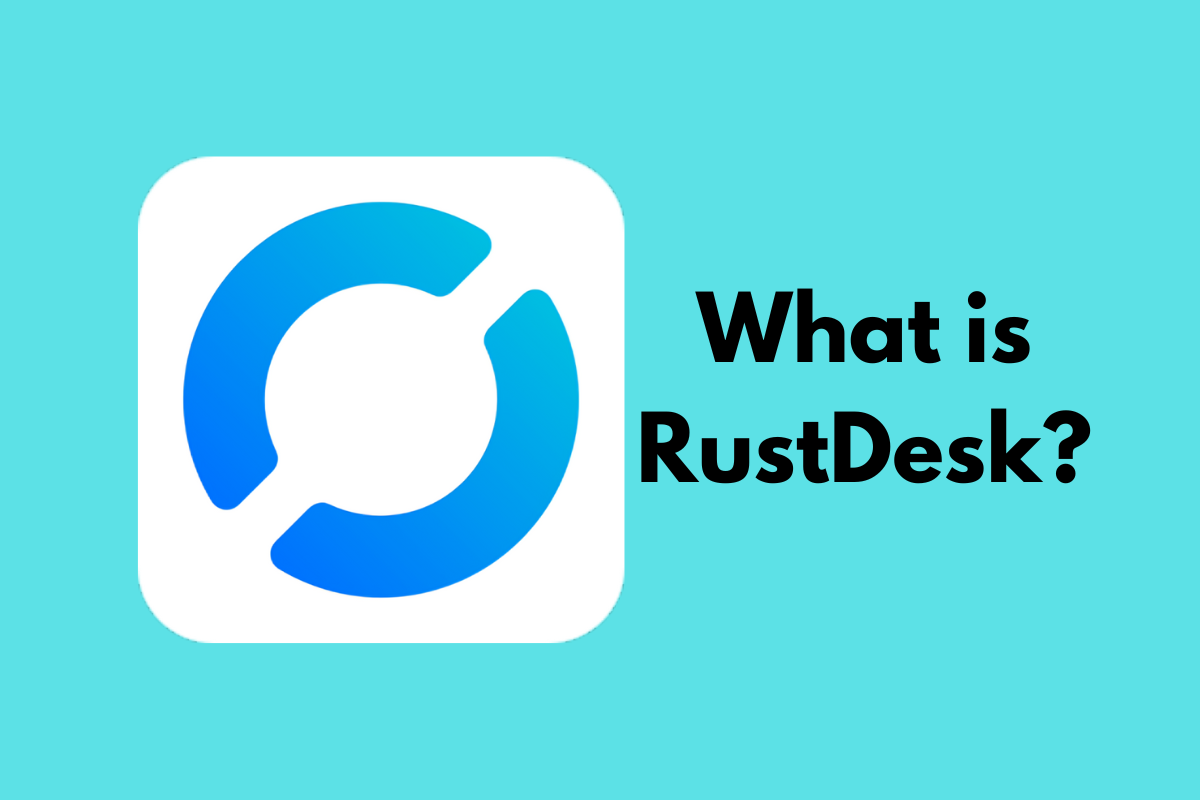Introduction
RustDesk is a remote access and control software developed primarily in Rust. It allows users to maintain computers and devices remotely without the need for additional tools like VPNs or port forwarding. It serves as an open-source alternative to remote desktop software such as TeamViewer or AnyDesk.
History and Background
RustDesk was initiated by a network of early advocates, contributors, and champions. It is open-source, with its source code available on GitHub. Since version 1.2.0, RustDesk has been based on Flutter, replacing the previous proprietary Sciter UI runtime library. This transition has enabled enhanced functionality and performance improvements.
Purpose and Features Overview
RustDesk aims to provide a comprehensive solution for remote access and control across multiple operating systems, including Windows, macOS, Linux, iOS, and Android. Its features include end-to-end encryption, file transfer capabilities, chat features, and TCP tunneling.
Users can opt for a self-hosted server solution, ensuring full control over their data and enhancing security. With support for various software and hardware codecs, RustDesk offers seamless connectivity and efficient performance. Additionally, it offers lightweight installation and web access for remote control via a web browser, enhancing accessibility and convenience for users.
Getting Started with RustDesk
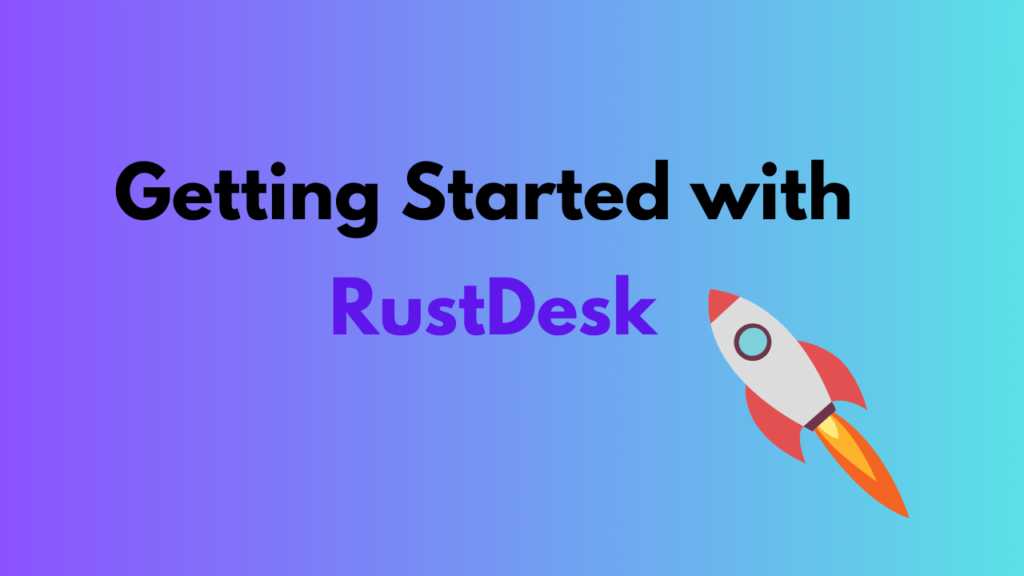
RustDesk is a versatile remote desktop software compatible with various operating systems, including Windows, macOS, and Linux. This guide will walk you through the process of downloading, installing, and understanding the system requirements and compatibility of RustDesk.
Downloading and Installing RustDesk
For Linux:
- Identify the Latest Version: Visit the official GitHub repository or release notes to find the latest version of RustDesk.
- Download RustDesk:
wget https://github.com/rustdesk/rustdesk/releases/download/<latest_version>/rustdesk-<latest_version>.deb- Install RustDesk:
sudo apt install ./rustdesk-<latest_version>.deb -y- Run RustDesk:
rustdeskFor Windows:
- Download the Client:
- Visit the official RustDesk website or GitHub page to download the appropriate client for Windows.
- Installation:
- Unzip the downloaded file.
- Run the client executable and follow on-screen instructions for installation.
- Connecting Computers:
- Open RustDesk on both computers.
- Each will receive a unique ID.
- To connect, enter one computer’s ID into the other and provide the password generated by RustDesk.
- Self-Hosting Option:
- Optionally, set up a self-hosted server on Windows for local RustDesk use.
System Requirements
To run RustDesk Server Pro, ensure your server meets the following requirements:
- RAM: At least 4GB
- Processor: Dual-core 3.4GHz or greater
- Disk Space: 32GB or more
- Operating System: Windows 7, 8.1, 10, or Linux distributions like Ubuntu, Debian, Fedora, or CentOS.
- Additional Software: SteamCMD for Windows, or RUST Dedicated Server for Windows/LinuxGSM on Linux.
Compatibility with Operating Systems
RustDesk supports various operating systems, ensuring seamless remote desktop connectivity across platforms. Whether you’re on Windows, macOS, or Linux, RustDesk provides an open-source, feature-rich, and user-friendly experience for personal and business use.
Rust Desk User Interface and Navigation
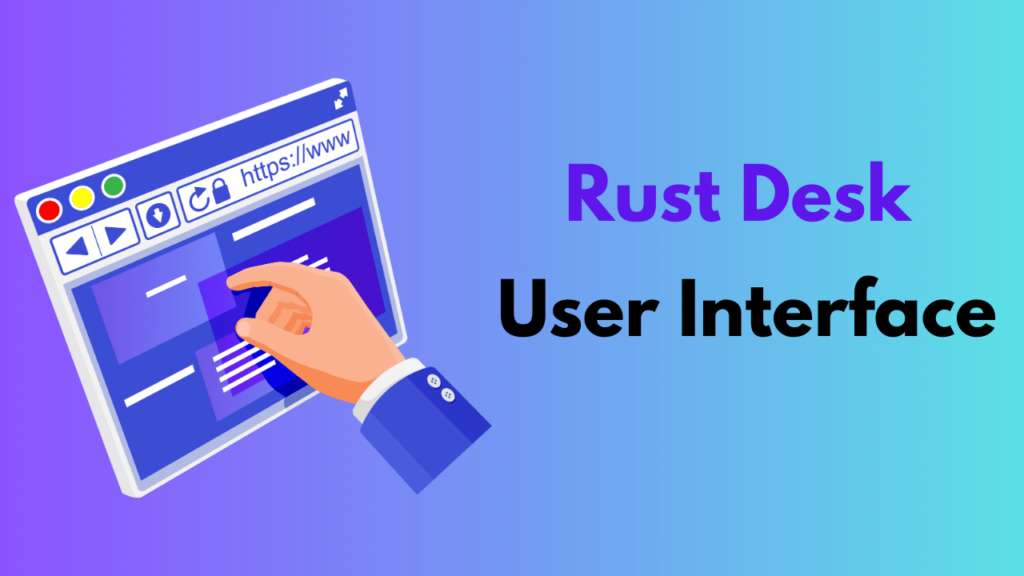
Overview of the Interface
The Rust Desk user interface (UI) is designed for simplicity and efficiency. It features a clean layout with intuitive navigation elements, aiming to enhance user productivity. The interface prioritizes essential functions while maintaining a minimalist aesthetic.
Navigation Features
- Sidebar Navigation: Rust Desk utilizes a sidebar menu for primary navigation. Users can easily access different sections and features of the application from the sidebar, enhancing accessibility and reducing the time required to switch between tasks.
- Search Functionality: A robust search feature allows users to quickly find specific tools, documents, or settings within the application. This feature streamlines navigation, particularly for users working with extensive data or multiple projects.
- Breadcrumb Navigation: Rust Desk incorporates breadcrumb navigation to provide users with clear indications of their current location within the application’s hierarchy. This feature enables seamless navigation between parent and child pages or sections.
- Keyboard Shortcuts: The UI includes keyboard shortcuts for common tasks and navigation actions, empowering users to navigate the application efficiently without relying solely on mouse input.
Customization Options
- Theme Customization: Users have the ability to customize the appearance of Rust Desk according to their preferences. The application offers a range of themes, color schemes, and font options, allowing users to personalize their workspace for improved comfort and aesthetics.
- Toolbar Customization: Rust Desk enables users to customize the toolbar to prioritize frequently used tools and functions. This customization option enhances user efficiency by providing quick access to essential features tailored to individual workflows.
- Widget Configuration: The application supports widget-based customization, allowing users to configure the layout and content of their workspace. Users can add, remove, resize, and rearrange widgets to create a personalized dashboard that aligns with their specific requirements and workflow preferences.
Rustdesk Limitations and Features
| Features | Limitations |
|---|---|
| Cross-Platform Compatibility | Limited Integration Options |
| Codec Support | Limited Hardware Acceleration |
| End-to-End Encryption | Limited File Transfer Size |
| Simple Setup and Configuration | Limited Remote Power Management |
| Terminal Access and Customization | Limited Multi-Monitor Support |
| Remote Power Management | Limited Chat and Collaboration Tools |
| Real-Time Chat | Limited Scalability |
| Multi-Platform Support | Limited Mobile App Features |
| Multi-Monitor Access | Limited Customization Options |
| P2P Connection | Limited Customer Support |
| Remote Desktop Access | Limited Performance Optimization |
| File Transfer Capabilities | Limited Operating System Support |
| Chat and Collaboration Tools | Limited Security Patch Updates |
| Security Features | Limited User Authentication Options |
| Performance and Scalability | Limited Bandwidth Optimization |
Key Features of RustDesk
Cross-Platform Compatibility
RustDesk supports multiple operating systems, ensuring accessibility across various devices.
Codec Support
RustDesk offers software codecs such as VP8, VP9, and AV1, along with hardware codecs like H264 and H265, providing flexibility in remote connections.
End-to-End Encryption
RustDesk employs end-to-end encryption based on NaCl for robust data security, ensuring confidentiality during transmission.
Simple Setup and Configuration
Designed for ease of use, RustDesk requires minimal configuration and no administrative privileges or installation on Windows.
Terminal Access and Customization
RustDesk provides a built-in terminal for Linux users and PowerShell/cmd access for Windows users, enabling customization and efficient task management.
Remote Power Management
Users can remotely manage power options such as shutdown or lock PC for easy system management from anywhere.
Real-Time Chat
RustDesk includes real-time chat capabilities for collaborative work and communication between remote users.
Multi-Platform Support
RustDesk supports various platforms including mobile, desktop, and web-based access, ensuring flexibility in remote access.
Multi-Monitor Access
Supports multi-monitor setups, enabling users to access and manage multiple monitors remotely.
P2P Connection
RustDesk utilizes P2P connections for efficient and secure remote desktop access.
Remote Desktop Access
Provides remote desktop access for seamless control of remote systems.
File Transfer Capabilities
Allows easy transfer of files between local and remote systems.
Chat and Collaboration Tools
Offers tools for chat and collaboration to enhance remote teamwork.
Security Features
Incorporates robust security measures to safeguard remote connections and data.
Performance and Scalability
Ensures high performance and scalability to accommodate varying user needs and workloads.
Limitations of RustDesk
RustDesk, like any software solution, comes with its own set of limitations. While it offers many benefits and features, users should be aware of the following constraints:
- Limited Customization: RustDesk may not offer extensive customization options compared to some other helpdesk software. Users with highly specific needs may find themselves constrained by its predefined features.
- Scalability Challenges: While RustDesk can handle the needs of small to medium-sized businesses well, it may face scalability challenges for larger enterprises with complex operations and high ticket volumes.
- Integration Complexity: Integrating RustDesk with other tools and systems may not always be straightforward. Users might encounter difficulties in seamlessly connecting it with existing workflows or third-party applications.
- Learning Curve: Despite its simplicity and user-friendly interface, RustDesk still requires some learning to fully leverage its capabilities. New users might need time to familiarize themselves with its features and functionalities.
- Limited Reporting and Analytics: The reporting and analytics capabilities of RustDesk might be basic compared to dedicated business intelligence tools. Users requiring in-depth insights and analytics may need to supplement RustDesk with additional software.
- Mobile Experience: While RustDesk likely offers mobile compatibility, the mobile experience might not be as robust as the desktop version. Users heavily reliant on mobile devices for customer support might find this limitation restrictive.
- Community Support: Compared to more established helpdesk solutions, RustDesk might have a smaller community of users and contributors. This could result in slower response times for support issues and fewer resources available for troubleshooting.
- Language Support: RustDesk may have limitations in terms of language support, particularly for businesses operating in multilingual environments. Users requiring extensive language options may find RustDesk lacking in this aspect.
- Advanced Features: For users needing advanced features such as advanced automation, AI-driven support, or omnichannel capabilities, RustDesk might not be the most suitable option. They may need to explore other solutions that offer a more comprehensive feature set.
- Security Considerations: While RustDesk likely implements security measures, users should assess whether it meets their organization’s specific security requirements. Depending on the industry and regulatory compliance needs, RustDesk’s security features may need augmentation.
Setting Up Remote Desktop Access
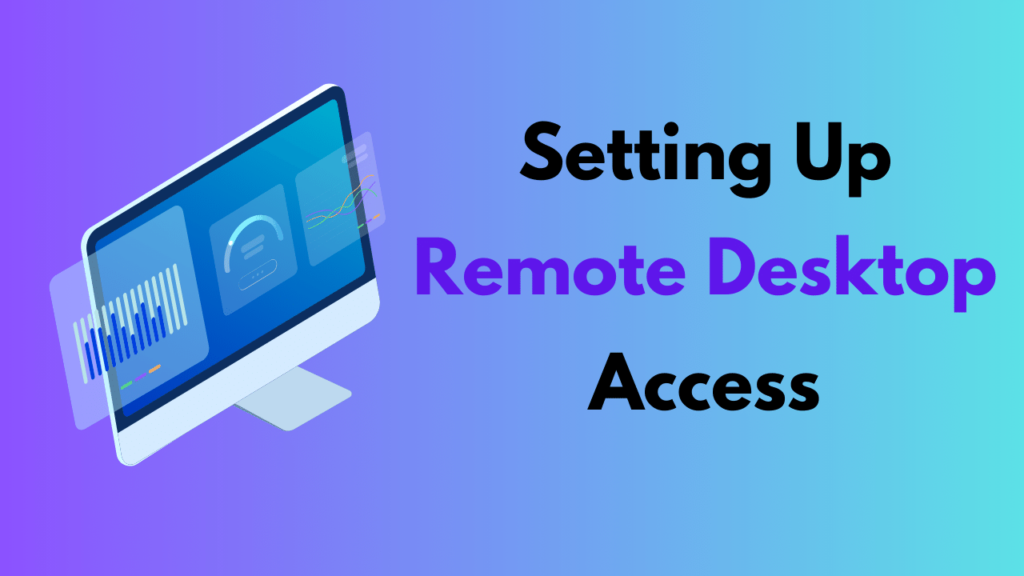
Download and Install RustDesk Client:
- Download the RustDesk Client from the official website.
- Install the client on your device by running the executable file.
- Follow the prompts to complete the installation process.
Configuring Remote Access
- Change the relay server settings to use your custom RustDesk server as a relay server.
- In my case, the server’s local IP was
192.9.0.1.
Authentication and Security Measures
- RustDesk incorporates modern encryption standards to ensure data transmitted between the local and remote machines remains secure and private.
- The application’s commitment to security aligns with industry best practices, providing users with a trustworthy and protected remote access experience.
Troubleshooting Connectivity Issues
- If you are unable to connect to RustDesk on many networks, it may be due to blocked ports on the network you are trying to connect from.
- In this case, you may need to use a different network or configure your firewall settings to allow the necessary ports.
File Transfer with RustDesk
How to Transfer Files Remotely
To transfer files remotely using RustDesk, follow these steps:
- Install RustDesk Client: Open the command line to the folder where RustDesk is installed.
- Establish Connection: Start RustDesk and enter the host side ID and password on the client-side PC.
- File Transfer: Click on “Transfer File” within RustDesk. Enter the RustDesk password and proceed to send and receive files between the host and client sides.
- Precautions: Encrypt critical files to prevent unauthorized access.
Managing File Transfers
Users have suggested the following features to enhance file transfer management in RustDesk:
- Typing to select a file/folder
- Browse button for folder selection
- Warning when sending/receiving a file that exists at the destination
- Clear transfer history
- Add timestamp to transfer history and sort results by newest first
- Allow copy/paste a file from the client PC directly into a folder on the remote PC
For more detailed information, refer to the article on Baeldung for a step-by-step guide on transferring files using RustDesk.
Security Considerations
RustDesk offers various security features to protect users’ data during remote desktop sessions:
- End-to-end encryption ensures data confidentiality.
- Authentication, authorization, and access control measures limit access to authorized users.
- Password protection strengthens security by requiring the correct password for access.
- Custom server options provide additional security and control over data.
- Key pair for secure handshaking enhances security during the connection process.
- Additional security features are available in RustDesk Server Pro, including log management, device management, security settings sync, access control, and multiple relay servers.
However, users should be cautious about the complexity of the Rust programming language and potential security concerns. Taking precautions such as setting strong passwords, using IP whitelisting, and running a personal RustDesk server can enhance security.
Collaborative Tools in RustDesk
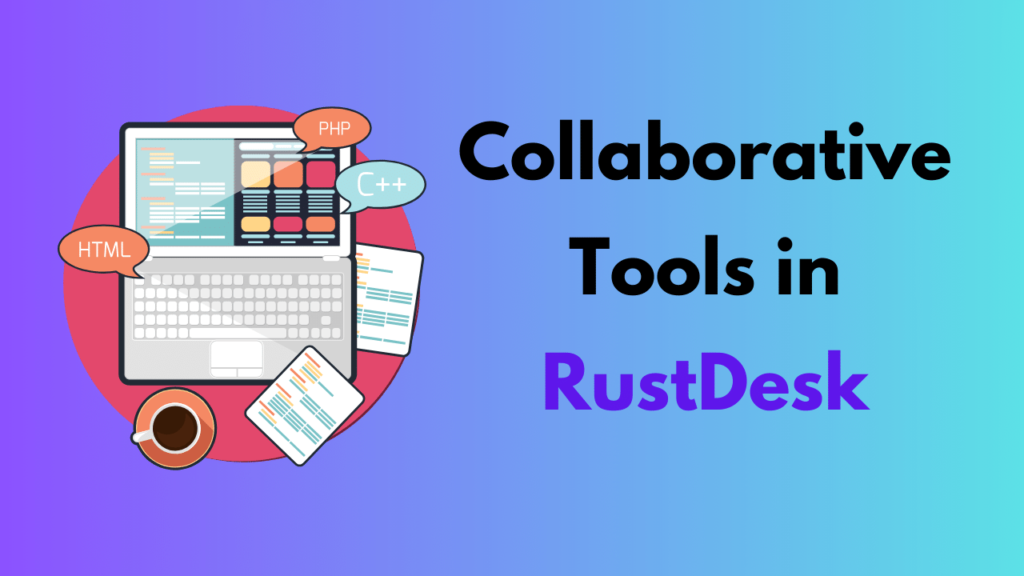
Chat Functionality: RustDesk includes a built-in chat feature that enables seamless communication during remote support sessions and facilitates real-time collaboration.
Screen Sharing: Users can share their screens with remote clients or colleagues, allowing support professionals to diagnose and resolve issues remotely while minimizing downtime and costly on-site visits.
Whiteboard Features: RustDesk offers a whiteboard feature as an additional collaboration tool for desktop sharing. This feature allows users to write or draw freely on the computer screen during presentations, enhancing the overall collaboration experience.
Real-time Collaboration: RustDesk fosters real-time collaboration by providing tools such as chat functionality, screen sharing, and whiteboard features. These capabilities bridge geographical gaps and make it an effective tool for remote meetings, presentations, and demonstrations.
Security Measures in RustDesk
RustDesk is an open-source remote desktop alternative to TeamViewer that prioritizes security and confidentiality in remote access experiences.
Encryption Protocols Used
To ensure the secrecy and integrity of data during remote connections, RustDesk employs advanced encryption techniques. It supports both RDP and VNC protocols for remote desktop functionality. The VNC protocol enables users to connect securely to a remote Linux system’s graphical user interface.
Authentication Methods
RustDesk employs multiple security features such as authentication, authorization, access control measures, and password protection. These measures ensure that only authorized users can access remote desktop sessions, enhancing overall security.
Best Practices for Secure Remote Access
Organizations utilizing RustDesk or similar remote desktop solutions should adhere to best practices to safeguard sensitive data during remote connections. These practices include:
- Implementing data protection, backup, and recovery measures.
- Enabling multifactor authentication (MFA) to add an additional layer of security.
- Employing sandbox analysis to block malicious emails and mitigate potential threats.
- Deploying the latest versions of security solutions across all layers of the system, including email, endpoint, web, and network infrastructure devices.
- Conducting regular vulnerability assessments and applying patches or virtual patches for operating systems and applications.
- Ensuring that software and applications are regularly updated to their latest versions to mitigate the risk of ransomware attacks.
Advanced Features and Customization Options
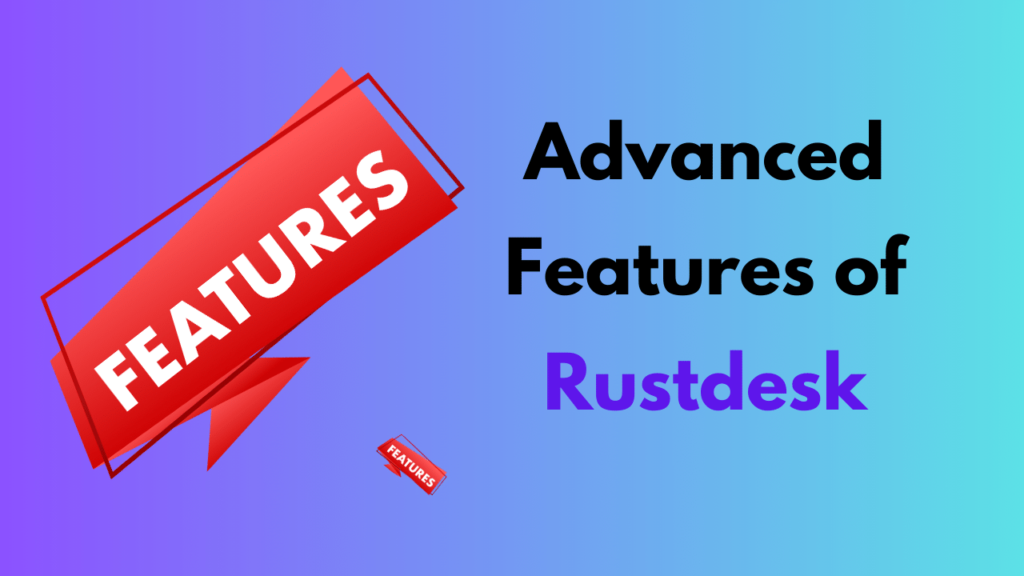
RustDesk offers a plethora of advanced features and customization options to tailor the remote desktop experience according to user preferences and requirements.
Customizing User Settings
Users can finely adjust their RustDesk experience by customizing various settings to suit their individual needs. This includes the ability to adjust server settings directly within the client, either by building it locally or utilizing GitHub Actions. Configuration options encompass setting the server URL and public key, offering users flexibility and control over their setup.
Integrating RustDesk with Third-Party Applications
RustDesk facilitates seamless integration with third-party applications, empowering users to enhance their remote desktop experience by leveraging external tools and services. This integration capability opens up possibilities for extending functionality and streamlining workflows within the RustDesk environment.
Advanced Configuration Options
Configuration File Support
- Users can utilize a configuration file (e.g., config.txt) for self-hosted servers.
- This file, placed in the executable’s directory or under /etc, allows for adjustments to host and public key settings, among others.
Environment Variable Integration
- RustDesk supports reading environment variables for configuration.
- This provides a more operating system-agnostic solution, catering to diverse environments and setups.
Embedding Custom Data in Executables
- Advanced users can embed custom data directly into the executable.
- This enables seamless reconfiguration of the client, offering flexibility and customization as needed.
Automatic Client Configuration
- Users can rename the client and embed configuration parameters in the filename for automatic configuration.
- Alternatively, integration with GitHub Actions facilitates the creation of customized, signed executables for distribution.
- This streamlined approach simplifies the deployment process and ensures consistent configurations across user devices.
Performance and Scalability
RustDesk stands out as a remote desktop software celebrated for its exceptional performance, security features, and intuitive interface. Crafted with the Rust programming language, it ensures rapid, efficient, and dependable operation. RustDesk caters to diverse needs, offering flexibility and scalability for both businesses and individuals.
Performance Optimization Tips
RustDesk’s design prioritizes smooth operation, even during demanding tasks or significant data transfers. Its unique memory safety features guarantee reliable performance and seamless remote connections.
Scalability Considerations for Large Organizations
In large organizations, RustDesk demonstrates robust performance and adaptability to various scenarios, including slower connections. While it may not be the optimal choice for managing extensive networks compared to specialized tools like MeshCentral, RustDesk offers reliable performance and customization options.
Handling Resource Intensive Tasks
RustDesk shines when tackling resource-intensive operations. Its memory safety features ensure stable performance under heavy workloads, making it a preferred choice for managing demanding tasks.
Use Cases and Applications
RustDesk is a versatile open-source remote desktop access software designed to cater to various needs across different sectors. Its flexibility and security make it an ideal solution for a range of applications.
Remote Work Scenarios
RustDesk provides a secure and adaptable remote desktop solution, enabling remote workers to access their work computers from anywhere and at any time. It supports multiple platforms and ensures end-to-end encryption for data security.
IT Support and Helpdesk Solutions
In the realm of IT support, RustDesk serves as a valuable tool for delivering remote assistance to clients. IT professionals can remotely access and control client devices, all while organizations maintain control over their data through self-hosted deployment.
Educational and Training Applications
For educational purposes, RustDesk facilitates remote access to lab computers and other resources, empowering both students and teachers to connect from any location. Its lightweight and easy-to-install nature make it suitable for diverse platforms.
Software Development and Testing
RustDesk plays a crucial role in software development and testing environments by providing remote access. Developers can seamlessly connect to development and testing environments from anywhere, while organizations retain control over their data and infrastructure through self-hosted deployment.
RustDesk vs. Competitors: A Comparative Analysis
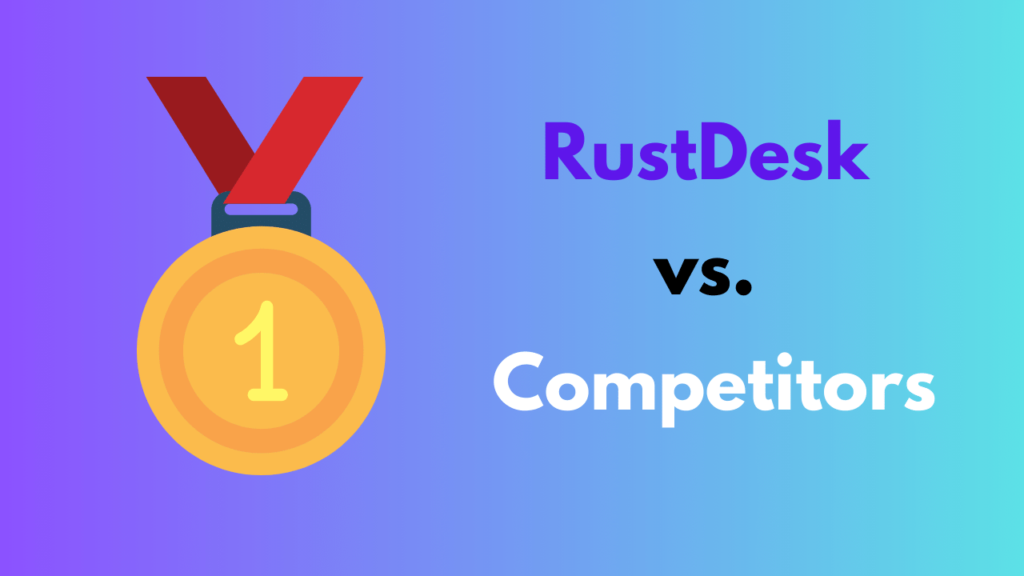
Strengths and Weaknesses:
Strengths:
- Rust Programming Language: RustDesk benefits from its implementation in Rust, offering advantages in memory safety, performance guarantees, and reduced memory security issues.
- Open-Source Nature: RustDesk’s community-driven development model fosters faster innovation, better security, and lower costs compared to proprietary solutions.
- Performance: RustDesk’s self-hosted server delivers faster connections and improved performance, appealing to users seeking reliability.
- Security: Users have full control over their data with RustDesk’s self-hosted solution, reducing the risk of data breaches and unauthorized access.
- Ease of Use: RustDesk offers a simple setup process and user-friendly interface, catering to users with varying technical expertise.
Weaknesses:
- Branding: Emphasizing Rust implementation may alienate users not prioritizing programming languages in decision-making.
- Hosted Server Limitations: RustDesk’s hosted server is not suitable for production use, limiting its appeal.
- Community Support: Quality and availability of community support may vary compared to solutions with dedicated support teams.
- Licensing and Pricing: Uncertainty around future licensing and pricing models may deter long-term commitment.
Unique Selling Points:
- Rust Programming Language: RustDesk’s use of Rust emphasizes security, performance, and lean software design.
- Open-Source Nature: Users can contribute to development, access source code, and benefit from community-driven innovation.
- Performance and Security: Self-hosted server offers better performance and enhanced security, catering to users seeking customization.
- Ease of Use: Despite technical strengths, RustDesk maintains a user-friendly design, ensuring accessibility across user skill levels.
RustDesk vs. AnyDesk:
| Feature | RustDesk | AnyDesk |
|---|---|---|
| Programming Language | Rust | Not Specified |
| Open Source | Yes | No |
| Performance | Faster connections, better performance | High performance, reliable connections |
| Security | Enhanced with self-hosted solution | Secure, encrypted connections |
| Ease of Use | User-friendly interface | Intuitive interface, easy to navigate |
| Community Support | Varies depending on community activity | Dedicated support available |
| Licensing and Pricing | Future model under development | Subscription-based pricing |
| Customization | Highly customizable | Limited customization options |
| Platform Availability | Windows, macOS, Linux | Windows, macOS, Android, iOS, Linux |
| File Transfer | Yes | Yes |
| Remote Printing | Yes | Yes |
| Session Recording | Yes | Yes, with additional features |
| Scalability | Scalable with self-hosted solution | Scalable for enterprise use |
| Integration | Limited integration options | Integration with third-party tools |
Troubleshooting Common Issues
Connectivity Problems
- Symptoms: Laggy video calls, slow application/network speed, buffering downloads, choppy VoIP quality, and no internet connection.
- Causes: Faulty hardware, unexpected usage patterns, network bandwidth spikes, changes in app configuration, or security breaches.
- Solutions: Use network monitoring tools to identify issues, isolate the problem devices, and analyze network traffic for patterns causing connectivity problems.
Performance Issues
- Symptoms: Slow network speeds, weak Wi-Fi signals, physical connectivity issues, excessive CPU usage, slow DNS lookups, and duplicate/static IP addresses.
- Causes: New applications, failing switch ports, network congestion, physical cable damage, high CPU/memory usage, slow DNS servers, and IP address conflicts.
- Solutions: Utilize network monitoring tools, rearrange office layouts for better Wi-Fi signals, check physical cable connections, monitor CPU/memory usage, optimize DNS configurations, and manage IP address assignments effectively.
Compatibility Challenges
- Issues: Backward compatibility affecting Wi-Fi performance and connectivity.
- Challenges: Legacy clients consuming more airtime, causing medium contention overhead, and connectivity problems with new Wi-Fi capabilities.
- Solutions: Disable new features on access points to accommodate legacy clients, address connectivity problems with legacy client drivers, and consider the impact of backward compatibility on Wi-Fi security.
FAQs and Solutions
- What makes RustDesk stand out among other remote desktop applications?
- RustDesk stands out due to its open-source nature, cross-platform compatibility, and user-friendly interface, making it accessible to a wide range of users. Its robust features, including file transfer capabilities, clipboard sharing, and multi-monitor support, further enhance its appeal.
- Is RustDesk suitable for both personal and business use?
- Yes, RustDesk is suitable for both personal and business use. Its versatility and security features make it an ideal choice for individuals seeking remote desktop solutions, as well as businesses requiring efficient remote collaboration and technical support tools.
- How does RustDesk ensure security?
- RustDesk prioritizes security by implementing robust encryption protocols and authentication mechanisms, ensuring the confidentiality and integrity of remote desktop sessions.
- Does RustDesk support file transfer capabilities?
- Yes, RustDesk offers seamless file transfer capabilities, enabling users to transfer files between the local and remote systems with ease.
- Can users self-host their own RustDesk server?
- Yes, users can self-host their own RustDesk server, which is free and open source. This provides an alternative to paid remote desktop software like TeamViewer.
- How does RustDesk handle connections?
- RustDesk facilitates direct connections between clients and controlled devices, and in cases where direct communication is not possible, it utilizes a relay server to establish connections.
- What are the supported operating systems for RustDesk?
- RustDesk is available for Windows, macOS, Linux, Android, and iOS, offering cross-platform compatibility and ease of use.
- Is RustDesk open source?
- Yes, RustDesk is an open-source remote desktop client, allowing users to access and control a computer from a remote location. It provides a secure and efficient way to connect to a desktop environment.
- Can RustDesk be used for remote work, technical support, and collaboration?
- Yes, RustDesk can be used for remote work, technical support, and collaboration, making it a valuable tool for remote access and control.
Rustdesk: Community and Support Resources
Official Documentation
The documentation covers installation instructions, configuration settings, troubleshooting tips, and more. Whether you’re a beginner or an experienced user, the official documentation serves as a comprehensive resource to help you make the most of Rustdesk.
Community Forums and Discussion Boards
Engage with fellow Rustdesk users, share experiences, and seek assistance on community forums and discussion boards. These platforms foster collaboration, enabling users to exchange ideas, troubleshoot issues, and discover innovative use cases for Rustdesk.
Join the community to connect with like-minded individuals, stay updated on the latest developments, and contribute to the growth of Rustdesk’s user community.
Support Channels
Rustdesk offers various support channels to cater to users’ diverse needs and preferences. Whether you prefer real-time communication or asynchronous support, there’s an option for you.
From official support email addresses to dedicated chat channels, Rustdesk ensures that users have access to timely assistance whenever they encounter challenges or have questions. Explore the available support channels to receive personalized help and guidance from the Rustdesk team and community.
Future Developments and Roadmap
Rustdesk, a remote desktop software known for its open-source nature and user-friendly interface, is contemplating the introduction of a paid version tailored for advanced business users. Despite this, the open-source variant will remain accessible to individual and small business users.
The Rust language’s development team is charting a roadmap aimed at enhancing scalability and accessibility. This roadmap revolves around three key themes: easing the learning curve, fostering community support, and facilitating project scalability.
Upcoming Features and Enhancements
Discussions within the Rustdesk community have hinted at the integration of an address book feature in the Pro version. This addition aims to provide businesses with a comprehensive alternative for remote management. Although an official roadmap for Rustdesk’s future developments is yet to surface, the team is actively considering various enhancements.
Community Feedback and Contributions
The Rust community continues to actively contribute to the Rustdesk project. Plans are underway to enable beta testing for the Rustdesk Pro version, showcasing the collaborative spirit within the community. Furthermore, efforts to refine the RustDesk client are evident, with the imminent release of version 1.2 anticipated.
Long-term Vision for RustDesks
Looking ahead, Rustdesk envisions a future where both its open-source and Pro versions cater to the diverse needs of users. The software aims to evolve in tandem with the evolving landscape of remote desktop solutions, prioritizing accessibility, functionality, and user satisfaction.
Conclusion
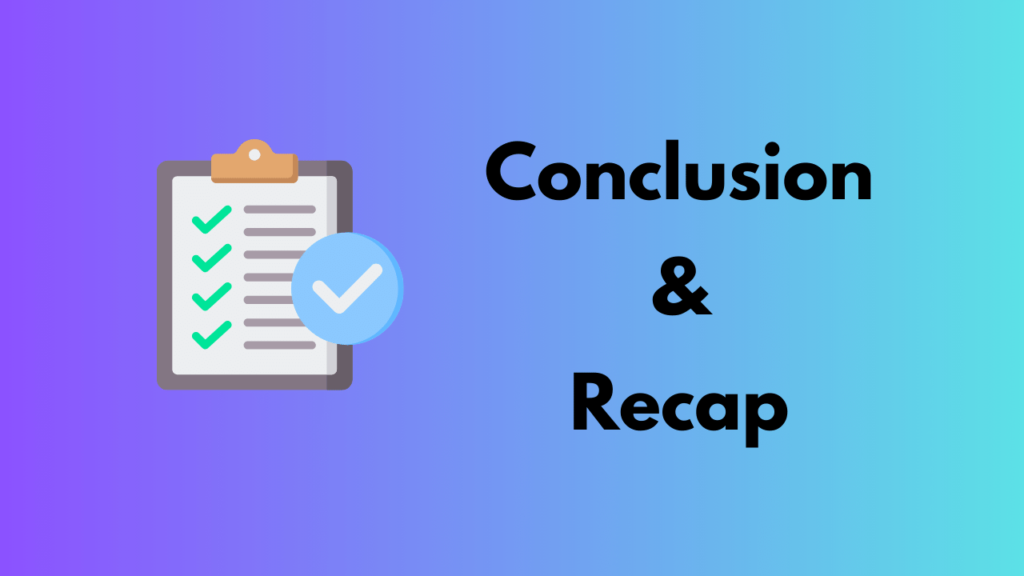
Rustdesk stands out as a remote desktop software renowned for its open-source nature, compatibility across platforms, user-friendly interface, and robust features like file transfer and multi-monitor support. It caters to both personal and business use cases, ensuring security through encryption protocols and authentication mechanisms during remote sessions.
Recap of Key Points
- Versatile Remote Desktop Client: Rustdesk caters to various user needs efficiently and securely.
- Cross-Platform Compatibility: It seamlessly operates across Windows, macOS, and Linux systems, offering flexibility.
- User-Friendly Interface: Remote desktop connections are simplified for users of all technical levels.
- Prioritizes Security: Robust encryption and authentication mechanisms ensure secure remote sessions.
- File Transfer Capabilities: Productivity is enhanced with seamless file transfers between local and remote systems.
Final Thoughts on RustDesk
Rustdesk emerges as a reliable and forward-thinking remote desktop solution, empowering users with secure, efficient, and user-friendly remote access capabilities. Its commitment to simplicity, security, and performance, along with community-driven development, positions it as a noteworthy player in the remote desktop software landscape.
Recommendations for Users
- Efficient Remote Access: Rustdesk is ideal for individuals and businesses seeking efficient and secure remote desktop solutions.
- User-Friendly Experience: Its intuitive interface and security features make it accessible to users of varying technical backgrounds.
- Cross-Platform Compatibility: Enjoy seamless remote desktop access across different systems for enhanced productivity.
- Security and Performance: Benefit from robust encryption, authentication, and optimal performance for reliable remote sessions.
- Community-Driven Development: Engage with the open-source community to contribute, innovate, and stay updated on the latest features and enhancements of Rustdesk.
Updated Date: 25/04/2024
